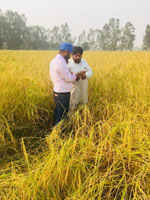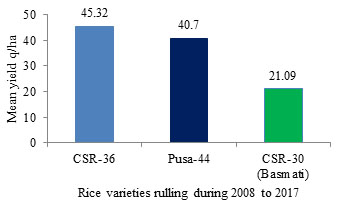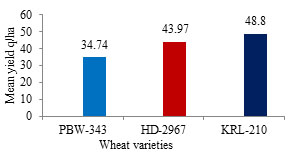 It was in the year 2009 when a group of farmers from Budhmour and Jodhpur villages of Patiala confronting sodicity-induced crop losses approached the scientists of ICAR-Central Soil Salinity Research Institute, Karnal. They narrated in detail as how steady rise in groundwater alkalinity and the accompanying land degradation had brought their lives to a standstill. Repeated crop failures in rice and wheat, ascribed to heavy plant mortality, yellowing, reproductive sterility and poor grain setting had become quite common resulting in moderate (30-40%) yield losses. A multidisciplinary team of scientists was constituted to visit the affected villages to understand the nature and extent of the problem. Subsequently, repeated visits were made to collect socio-economic profiles of the affected farmers as well as soil and irrigation water samples from affected lands so that appropriate remedial measures could be suggested and implemented. Diagnosis of soil and irrigation water samples from the affected fields of Jodhpur and Budhmour villages revealed heavy soil texture (silt + clay ~80.0%), high pH2 (8.5-9.5), moderate salinity (EC2 0.7-0.9) and high RSC in groundwater (3.5-4.1 meq L-1). Soils were also found to be deficient in organic carbon, available N and available P (Table 1).
It was in the year 2009 when a group of farmers from Budhmour and Jodhpur villages of Patiala confronting sodicity-induced crop losses approached the scientists of ICAR-Central Soil Salinity Research Institute, Karnal. They narrated in detail as how steady rise in groundwater alkalinity and the accompanying land degradation had brought their lives to a standstill. Repeated crop failures in rice and wheat, ascribed to heavy plant mortality, yellowing, reproductive sterility and poor grain setting had become quite common resulting in moderate (30-40%) yield losses. A multidisciplinary team of scientists was constituted to visit the affected villages to understand the nature and extent of the problem. Subsequently, repeated visits were made to collect socio-economic profiles of the affected farmers as well as soil and irrigation water samples from affected lands so that appropriate remedial measures could be suggested and implemented. Diagnosis of soil and irrigation water samples from the affected fields of Jodhpur and Budhmour villages revealed heavy soil texture (silt + clay ~80.0%), high pH2 (8.5-9.5), moderate salinity (EC2 0.7-0.9) and high RSC in groundwater (3.5-4.1 meq L-1). Soils were also found to be deficient in organic carbon, available N and available P (Table 1).
Table 1. Physico-chemical properties of sodicity affected lands in the study area
|
Soil (0-15cm) (n= 28) |
Water (n= 9) |
|||||||
|
Soil pH2 |
Soil EC2 |
Organic carbon (%) |
Available N (kg/ha) |
Available P2O5 (kg/ha) |
Available K2O (kg/ha) |
RSC meq L-1 |
pH |
EC (dSm-1) |
|
8.5-9.5 |
0.7-0.9 |
0.4-0.5 (low) |
143.9 (low) |
21.2 (low) |
228.8 |
3.5-4.1 |
7.8-8.2 |
0.7-0.8 |
 The initial results of soil and water analysis were communicated to the selected farmers. This was for the first time when affected farmers came to know about ‘RSC problem in irrigation water’ which was in fact the main underlying cause for land degradation and poor crop yields. Further, a participatory research plan was conducted for the four consecutive years (2009-2012) to draw valid conclusions about the problem. The concept leader of this success story (Dr. Ranjay K. Singh) together with a multidisciplinary team of scientists (Dr. R. K. Yadav, Dr. Satyendra Kumar, Dr. Anshuman Singh, Dr Arvind Kumar and Dr. Awtar Singh) involved in different projects and activities through which interventions were made, assessed the success. Results indicated that chiseling improved the grain yield of Basmati CSR-30 and Pusa-44 by 8.0% and 10.0%, respectively. Similarly, lesser leveling enhanced the yields by 12.0% in CSR-30 and by 15% in Pusa-44. In contrast, when high RSC irrigation water was passed through the gypsum beds (kept in tube-well chamber) increase in the grain yield was relatively higher (37.0%) in CSR-30 than in Pusa-44 (29.0%).
The initial results of soil and water analysis were communicated to the selected farmers. This was for the first time when affected farmers came to know about ‘RSC problem in irrigation water’ which was in fact the main underlying cause for land degradation and poor crop yields. Further, a participatory research plan was conducted for the four consecutive years (2009-2012) to draw valid conclusions about the problem. The concept leader of this success story (Dr. Ranjay K. Singh) together with a multidisciplinary team of scientists (Dr. R. K. Yadav, Dr. Satyendra Kumar, Dr. Anshuman Singh, Dr Arvind Kumar and Dr. Awtar Singh) involved in different projects and activities through which interventions were made, assessed the success. Results indicated that chiseling improved the grain yield of Basmati CSR-30 and Pusa-44 by 8.0% and 10.0%, respectively. Similarly, lesser leveling enhanced the yields by 12.0% in CSR-30 and by 15% in Pusa-44. In contrast, when high RSC irrigation water was passed through the gypsum beds (kept in tube-well chamber) increase in the grain yield was relatively higher (37.0%) in CSR-30 than in Pusa-44 (29.0%).
Success in rice
Farmers were motivated to adopt improved management practices and salt tolerant cultivars of rice (CSR-36 and CSR-30) and wheat (KRL-210) to stabilize the farm incomes under conditions of soil sodicity and high RSC in irrigation water. Due to these efforts, out of 35 sampled farmers, ≈60.0% of the farmers applied gypsum in the affected lands, 40.0% adopted lesser leveling, 15.0% tested chiseling and 5.0% adopted gypsum-bed technology for neutralizing RSC in irrigation water. Average rice yields were ≈4.4 and 4.0 t ha-1 in CSR-36 and Pusa-44, respectively (Fig. 1) reflecting a yield increase of ≈10.0% in CSR-36 over Pusa-44. It is pertinent to mention that although some farmers in the study area had adopted Basmati rice CSR-30 in 2007-2008, shortly before these interventions commenced, they failed to obtain satisfactory yields due to non-adoption of gypsum-based technology. Subsequently, gypsum application- either in soil or through irrigation water- considerably improved CSR-30 yields enabling the farmers to harvest ≈2.1 t ha-1 grain yield since 2010 (Fig. 2).
Success in wheat

Taking a cue from the astonishing success in rice crop, efforts were started to enhance wheat yields under similar conditions. In this area, farmers grew wheat variety PBW-343 during 2008-2012 and obtained average yields of 3.8 t ha-1. During 2013-2017, several farmers started cultivating HD-2967 which gave relatively higher average yields of 4.4 t ha-1 (Fig. 3). In the mean time, in 2015, salt tolerant wheat cultivar KRL-210 was demonstrated on selected farmers’ fields where it outperformed both PBW-343 and HD-2967. The mean grain yield of KRL-210 (4.9 t ha-1) was ≈29.0% and 10.0% higher compared to PBW-343 and HD-2967, respectively, under identical levels of soil pH and irrigation water RSC. A strong majority of the studied farmers (85.0%) informed that lack of government subsidy was the major hindrance to the adoption of gypsum-bed technology which involves one-time lump sum investment of ≈ Rs. 35,000 unit-1 for constructing the specialized chambers. As a consequence, though aware of potential benefits, most of the small and medium farmers are unable to adopt this technology. In comparison, relatively higher adoption of laser land leveling is attributed to the nominal costs (≈Rs. 3000 ha-1) of custom hiring every 3rd year.
Policy lessons
Experience gained during participatory trials with the farmers of Patiala district suggests that a single technology may not provide desired benefits in areas grappling with multiple stressors including soil sodicity, poor fertility, high RSC in irrigation water and climate variability. The need of hour is to ensure integrated adoption of two or more proven technologies for harnessing the productivity of salt-affected lands in the study area. There is conclusive evidence that technological interventions can lead to manifold increases in the productivity of saline and sodic soils provided farmers’ proactively work with the scientists and extension functionaries. A need is being felt for MOU between the Government of Punjab and ICAR-CSSRI to fast track the adoption of an integrated package of improved technologies among large number of farmers reeling under the adverse impacts of sodicity, fresh water scarcity and climate variability.
(Source: ICAR-Central Soil Salinity Research Institute, Karnal-132001, Haryana)








Like on Facebook
Subscribe on Youtube
Follow on X X
Like on instagram